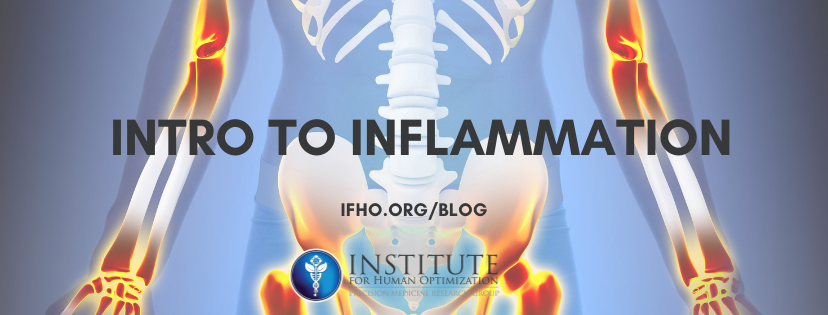INTRO TO INFLAMMATION
With many major diseases linked to chronic inflammation, persistent inflammation is our enemy. What is the answer? It is not found in our medicine cabinet or the pharmacy. The best way to reduce inflammation can be found in our refrigerator through proper nutrition. But what is inflammation? Could you benefit from promoting an anti-inflammatory diet?
. . .
What is Inflammation
There are five cardinal signs of inflammation. One of the greatest medical writers, Aulus Cornelius Celsus described the first four of the main signs of inflammation as redness, heat, swelling, and pain. The fifth sign was later identified by Galen as a disturbance of function. Inflammation refers to the body’s immune system response to e.g., a foreign pathogen, injury, or infection. Our body’s inflammatory response is a remarkable protective part of our immune system. If you fall and scrape your skin, your immune system will release an army of white blood cells to immerse and protect the area which results in the visible redness and swelling commonly seen after an injury. When you have a cold the symptoms you experience such as a scratchy throat, sneezing, runny nose, are all by-products of inflammation as our body’s immune cell signaling to destroy virus particles. If you have ever experience green mucus, that is caused by myeloperoxidase, a green-colored protein that is found in infection-fighting white blood cells. It becomes green due to the white blood cell numbers increasing while you are sick (white blood cells are low in the early stages of inflammation) and therefore the amount of green myeloperoxidase increases ultimately changing the color of mucus. So how can inflammation be bad?
Acute vs Chronic
Acute inflammation is obvious as it is a brief inflammatory response. Chronic inflammation on the other hand is another story that can lead to adverse health consequences. Simply put, your body is not designed to live in a state of chronic inflammation. When your body is in a chronic state of inflammation, your body is constantly under attack with your immune system on overdrive. This means that white blood cells that would go to an injured or infected area, may end up attacking healthy tissues and organs.
How so? Let’s say you carry visceral fat, which is the type of fat that is stored within the abdominal cavity near vital organs like the liver, stomach, intestines. This type of fat is considered “active” fat because it can actively increase your individual risk of disease. Visceral fat is a known link to metabolic disorders and inflammation. If you suffer from chronic inflammation, your white blood cells may perceive those visceral fat cells as a threat and begin to attack them.
Prolonged State of Inflammation
While inflammation is your body’s first line of defense, being in a prolonged state of inflammation can cause lasting damage. Let’s look at how inflammation plays a role in disease:
Alzheimer’s Disease: Anyone who has had a loved one with Alzheimer’s knows how terrible this disease is. Alzheimer’s disease is a progressive neurodegenerative disorder that destroys memory and affects many essential mental functions. While the exact answer is still unknown, Alzheimer’s is thought to be a result of an abnormal buildup of the proteins in and around brain cells specifically, the proteins called amyloid and tau. With many neurodegenerative disorders, chronic inflammation is a known core characteristic. Over the last decade, there have been studies show inflammation as a central mechanism in Alzheimer’s disease. Recent literature shows how inflammation accelerates Alzheimer’s disease pathologies as it exacerbates both amyloid and tau pathologies.
Heart Attacks & Strokes: When we look at heart attacks and strokes, atherosclerosis is usually the culprit. Atherosclerosis refers to a build-up of cholesterol-rich plaque inside arteries. Recent research from Harvard recognized that chronic inflammation sparks atherosclerosis. When cholesterol-rich plaque inside arteries causes inflammatory cells to cover and obstruct flowing blood, this results in blood clots that obstruct blood flow to the heart or brain. An artery to the heart that is blocked results in a heart attack. A blocked artery in or leading to the brain results in an ischemic stroke.
Rheumatoid Arthritis (RA): RA is a chronic inflammatory disorder that usually begins by causing pain in the joints of your hands and feet. This occurs because your body is in a state of chronic inflammation and mistakes your e.g., joints for a threat.
Type 2 Diabetes: Diabetes is a complex multifaceted metabolic disorder that results in your blood glucose or blood sugar levels being too high. In type 2 diabetes, your body does not produce enough or insulin or cannot use the insulin it is producing effectively. It is common knowledge that obesity and inactivity are positively associated with the development of type 2 diabetes. Obesity and inactivity are also positively linked to chronic inflammation. Researchers have shown how an inflammatory state alters insulin’s action and drives the development of type 2 diabetes. The role of inflammation has generated interest to improve clinical outcomes with the control of the disease. Recent studies show how inflammation is linked to diabetes and targeting inflammatory pathways may prevent type 2 diabetes.
Is your lifestyle contributing to your inflammation?
Certain habitual lifestyle choices promote inflammation. For example, if you are not getting regular quality sleep, you may be contributing to inflammation. Sleep and our immune system are regulated by circadian rhythms. When we are not getting adequate sleep, we disrupt our circadian rhythm and subsequently, our immune system. Inactivity is also associated with a weakened immune system and inflammation. In a recent Harvard study, they show a molecular connection between exercise and inflammation. In this study, they put one group of laboratory mice with treadmills which resulted in mice running as much as six miles a night. The second group of mice had no treadmills. At the end of the 6-week study, the mice in the group with the treadmills had substantially lower HSPC activity and level of inflammatory leukocytes than the group of sedentary mice.
In a recent blog article, we discussed the role of vegetable oils and how they can contribute to inflammation. A recent research study shows meal-induced inflammation plays role in chronic inflammation. Meal-induced inflammation is more common than we think due to the American diet being filled with ultra-processed foods. Processing is what changes food from its organic state. Ultra-processed foods are foods made with several industrial processes and ingredients that result in food being nothing like the original food (think strawberry cupcakes vs strawberries). In general, ultra-processed foods are high in calories, fat, sugar, salt, and additives with little to no nutrients. What are some examples of inflammatory foods? Hint: They are the foods that we know to avoid regularly.
Examples of Inflammatory Foods:
- Fried Foods
- Soda
- Some Red Meat –Not all red meat is the same. It is important to look at how you eat red meat, the quality, and the quantity.
- Processed Meats – such as Hot Dogs, Sausage
- Trans fats (partially hydrogenated oils)
- Added sugars
- Refined carbohydrates
- Vegetable Oils
- Margarine
- Alcohol
While foods can be inflammatory, there are so many food options that are anti-inflammatory, nutrient-dense, high quality, and delicious. Some great anti-inflammatory food options include:
- Berries
- Dark Leafy Greens
- Nuts
- Extra Virgin Olive Oil
- Chia Seeds
- Ground Flax Seeds
- Omega 3-Fatty Fish such as Wild Caught Salmon
- Cruciferous Vegetables
- Avocados
- Peppers
- Mushrooms
Chronic Inflammation is something you can see and feel but can be hard to detect clinically. Our best offense towards chronic inflammation is an anti-inflammatory lifestyle. Your comprehensive dietary patterns and lifestyle can promote longevity or an inflammatory response among many other undesirable health outcomes. In fact, the lifestyle factors Physicians warn against such as stress, sleep deprivation, inactivity, poor diet, smoking, are ALL contributory to inflammation. At the Institute for Human Optimization, we use food sensitivity testing and/or assess inflammatory markers to create a personalized approach to reduce inflammation as needed.










All of the anti-inflammatory foods on your list above cause reactions for me, including inflammation. My diet is limited due to ibs/leaky gut/salicylate issues. I eat no processed foods at all. Do you have any suggestions for people on this side of the equation, thank you.